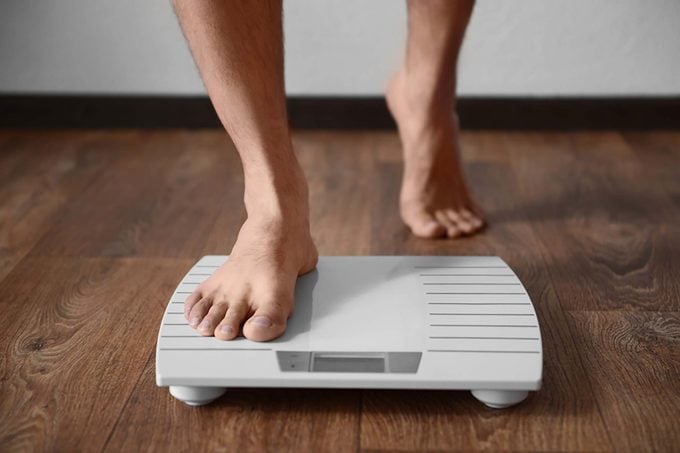Does the Bone Broth Diet Work for Weight Loss?
Updated: Jul. 01, 2022
Food experts weigh in on the bone broth diet, whether it works for weight loss, and the health risks and benefits of this diet.
Our editors and experts handpick every product we feature. We may earn a commission from your purchases.
You’re already familiar with broth and stock. Now it’s time to meet their thicker and more potent “big brother,” bone broth. So what’s the real difference between stock and broth? Jessica DeLuise, physician assistant and founder of Eat Your Way to Wellness, says that regular broth is made from meat flesh, veggies, and aromatics. Stock is made from bones, fresh veggies, and aromatics simmered for up to 18 hours. Bone broth is similar to stock but simmered for 18 to 24 hours or longer to break down the collagen and minerals in the bone and allow them to thicken the broth.
“Bone broth is a traditional food that involves the slow simmering of bones and veggies for an extended period of time, making it a rich source of collagen, gelatin, and amino acids, and minerals,” says Samantha Presicci, a lead registered dietitian at Snap Kitchen, certified personal trainer, and Whole30 certified coach.
How long has bone broth been around?
Anthropologists have evidence that cave dwellers were brewing bone soup. Later, Native Americans similarly boiled bones in baskets. More than 2,200 years ago, the Chinese created special earthenware pots to cook bone broth over open fires. In the 12th century, Egyptian physicians prescribed bone broth as a remedy for colds and asthma, according to Roben Westen’s book, Heal Your Gut with Bone Broth.
Bone broth can be rich in some nutrients— such as protein and vitamins A and C—and have decent levels of fiber and calcium. However, it can also be high in sodium. Many bone broth advocates tout the added benefits of the broth’s collagen, saying it can help with healthy bones and skin, even helping prevent or relieve osteoporosis, osteoarthritis, or other bone- and skin-related issues. But there’s little science to support that claim.
There’s no research that shows bone strengthens bone or eases joint pain, reports Harvard Health. It doesn’t make skin firmer or smoother. Dietary collagen is broken down into amino acids by your body. It isn’t transported directly to your bones, joints, or skin.
What is the bone broth diet?
Kellyann Petrucci, MS, ND, a naturopathic physician and weight-loss specialist, wrote the book Bone Broth Diet. This 21-day diet claims to harness the nutritional power of bone broth to promote gut health, reduce chronic inflammation, reverse the signs of aging, regain energy, eliminate headaches, and support autoimmune diseases.
What do you eat on the bone broth diet?
The 21-day plan involves following the paleo diet five days a week. That means eating animal protein, fruits, veggies, nuts, seeds, and healthy fats while avoiding grains, dairy, sugar, and artificial sweeteners, processed foods, and legumes. On the other two days, you fast by consuming only bone broth.
On the days that you eat paleo, you replace your snacks with bone broth. On the fasting days, you replace all meals with bone broth. If you need a little inspiration, start with these 12 paleo diet foods that are nutritional powerhouses.
How does the bone broth diet promote weight loss?
“I like the bone broth diet for a few reasons,” says DeLuise. “Bone broth is high in protein, collagen, and minerals, which can support healthy tissues, satiety, and gut healing. Plus, while eating paleo, you’re removing the majority of potential foods that could cause bloating or weight gain, such as dairy, wheat, and beans.”
By sipping on bone broth between meals, she says dieters may feel less of an urge to grab a processed, sugar-laden snack. And since it’s mostly water, it’s an easy and delicious way to hydrate the body. All of these properties work together to help lower overall calorie intake. Finally, the fasting days with bone broth align with many beliefs of fasting and intermittent fasting for wellness, which have been associated with weight loss and improving insulin resistance.
What kind of weight loss can people expect?
Everyone is different, so potential benefit varies. “It’s possible someone could probably lose between five to 10 pounds in 21 days, with much of that being water weight,” says Presicci, “but I definitely do not recommend or encourage attempting quick weight loss. Since this diet is only meant for 21 days, people may treat it as a crash diet and miss the opportunity to use it as a reset for gut, hormone, and overall health.”
What are the additional benefits beyond weight loss?
“There are numerous benefits to eating a paleo diet and drinking bone broth, including decreased inflammation, better sleep, improved skin health, normal blood sugars, improved gut health, and more,” says Presicci. “The key with both of these approaches is to be consistent. It won’t help to follow a plan for 21 days if you’re not planning to continue those habits long-term. The benefits of paleo and of bone broth are only going to be seen if both habits are practiced consistently.”
Are there any risks to this diet?
There’s been some concern that bones can store heavy metals, particularly lead, which can then leach into the broth as it is prepared. However, a study published in Food and Nutrition Research found that lead levels in broth are minimal and likely pose no health risks.
Rachel Fine, RD, owner of To The Pointe Nutrition, says that the bone broth diet is a “dangerously restrictive diet” and calls it “an unhealthy, short-term fix for weight loss, which will further result in the vulnerability to increased weight gain later on.” She warns that the long-term negative effects of a restricted diet outweigh potential short-term benefits because restricting carbs causes the body to release specific hormones to counter the restriction, promoting increased cravings. Essentially, it could backfire. (Check out the clear signs that you’re on a bad diet.)
Before starting any diet, it’s smart to check with your dietitian or health practitioner to figure out if it’s a good fit for you—particularly if you are on medication, have hypoglycemia, or are pregnant or breastfeeding. “Especially for someone new to healthy eating, I’d recommend avoiding the fasting days and instead incorporating bone broth into their day of eating,” advises Presicci. “Bone broth can help decrease water retention and inflammation, even if you don’t change much else in your diet.” If you’re determined to try fasting, start the process with this intermittent fasting guide.
Where do you find bone broth?
You can easily make it at home or buy store-bought versions. If making at home, Presicci says to choose pasture-raised bones and filtered water for your recipe. If you buy bone broth from the store, make sure you’re buying bone broth and not stock. Bone broth has been slow cooked for 24-plus hours, leaching important nutrients from the bones, whereas stock is cooked for a lot less time and as a result, it has less collagen and gelatin.


